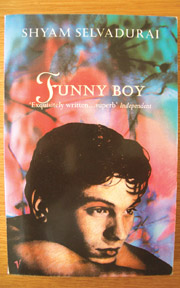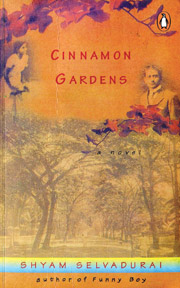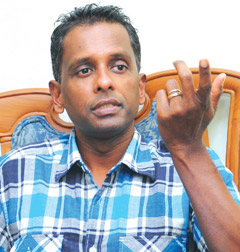Dare to be different
Ruwini JAYAWARDANA
 Like many immigrant writers, his heart is bound to his 'literary
home'. This is evident in his books: Funny Boy (1994), Cinnamon Gardens
(1999) and Swimming in the Monsoon Sea (2005), all of which have taken
Sri Lanka as their setting. His skill lies in his ability to portray a
world threatened by intolerance yet possesses beauty, humour and
humanity. Like many immigrant writers, his heart is bound to his 'literary
home'. This is evident in his books: Funny Boy (1994), Cinnamon Gardens
(1999) and Swimming in the Monsoon Sea (2005), all of which have taken
Sri Lanka as their setting. His skill lies in his ability to portray a
world threatened by intolerance yet possesses beauty, humour and
humanity.
"I do not read any academic work on my books. Nor do I read reviews
because I do not think it is good to let that kind of stuff influence
how you think," says Sri Lankan-Canadian writer Shyam Selvadurai.
Our encounter in Daily News has bagged W. H. Smith/Books in Canada
First Novel Award, the Lambda Literary Award for Best Gay Men's Fiction
and the Lambda Literary Award for Best Children's and Youth Literature.
He had ensured a place for himself in the Sri Lankan English literary
arena. His debut novel is widely read and studied in Sri Lankan
universities. A degree holder in creative and professional writing at
York University Shyam had worked for a variety of media like magazines
and television before scoring success with his books.

Though his work is often dubbed as 'coming-of-age' stories, he
describes his writing as "a passion for language, a love for story and
an attempt to see where the two meet".
Q: You relate your stories mostly through a child's point of
view.

A: I don't know why I find it easier to voice the stories
through a child. It just works better for me. Some writers find it
easier to work on a certain language while others have to struggle with
it. For some writers the plot comes easy and for others the dialogues
flow naturally. I believe that one of the gifts given to me as a writer
is the ability to filter my thoughts through a child.
Q: You wrote Funny Boy after migrating to Canada. If you had
remained in Sri Lanka, would you have still written the novel?
A: No. The topic of gay sexuality was strictly taboo here. I
don't think I would have had the courage to write it then. However, I
think living in Canada shaped how I wrote the novel. I was in a much
freer society. My attitude whole have been different to the topic if I
had lived here.
Q: Arji's awakening sexuality is somewhat camouflaged due to
the Sinhala-Tamil ethnic tension in Funny Boy. Did you pen Swimming in
the Monsoon Sea as a means of tackling the subject in a wider angle?
A: I did not really think about it like that. Just writing a
gay novel does not appeal to me for that purpose because it has been
done before. For me the interesting point in Swimming in the Monsoon Sea
comes from writing a young adult's novel as well as documenting the
1980s in all its incredible details. For example nobody had tailors
coming to them to sew their clothes like Cut-and-Put. Amrith's love for
his visiting Canadian cousin is just one of the themes which runs
through the story.
|

Shyam Selvadurai. Picture by Lalith C Gamage |
Q: Cinnamon Gardens was initially going to be set in Malaysia.
Why didn't you go ahead with it?
A: When I set off to do something it generally turns into
something else! The inspiration for the novel came from the stories my
grandmother told me about her sister who had married and gone off to
Malaysia. She was a fiery woman. I also met Kumari Jayawardena at the
time and I learnt aspects about the women's movement taking place during
that era.
That fascinated me. I did write the part based in Malaysia in the
first draft but I felt the language dying on the page though I did push
it to the maximum.
I believe that is because I am not familiar with the Malaysian set
up. However the take on Malaysia is from an emigrant's point of view.
The character is going there as a foreigner but at some point I was not
as fascinated by it as I was by Sri Lanka. That maybe because the
material at hand was not rich enough.
Q: Critics have drawn parallels between Cinnamon Garden's
Annalukshmi and George Eliot's Dorothea Brooke. You have even included a
quotation from Middlemarch as an epigraph for Cinnamon Gardens. Did
Eliot influence you in writing the novel?
A: I did think of Dorothea to a certain extent when I formed
Annalukshmi's character but I think Dorothea is a much more reflective
character than Annalukshmi. The latter is more of a rebel.
I don't think of myself as a rebel though I do admire people who can
fire away. They make interesting characters but are lousy protagonists.
I think the main character should be a thinking person.
Q: You have said that creative writing needs talent but you
are the Professor of Creative Writing at York University.
A: True, you can't teach talent but you can teach technique.
Students enter the programme by portfolio.
We have a screening process to detect those with talent. Therefore
those who come to me embody skills but they have no craft. It is a
matter of teaching them the craft.
In North America and some parts of Britain Creative Writing is
recognised as an academic subject. But it is not considered as an
academic subject in a major part of Europe yet. I think Sri Lanka can
introduce creative writing within the context of English Literature.
Q: If someone calls your works racist, do you think that it is
a justifiable comment?
A: I think I have painted a fair portrait of the two
communities. The first time Arji discovers the word 'racisms', it is in
the context of his Tamil grandmother. This is when aunt Radha clashes
with her over marriage prospects and her love for a Sinhalese man.
I am of Sinhala and Tamil origin. I am caught between the two and
cannot side with any specific ethnic group.
I think more on the lines of a Sri Lankan than as a Tamil. I can
dwell into any heritage and any heritage is fair game for me. Therefore
I do not think it is a fair accusation.
Q: Do you feel that Sri Lanka had opened up to the topic of
homosexuality when you compare 1994 with the present situation?
A: I think homosexuality is not spoken about in a public way
in the media. I believe that homophobia still exists.
Q: You are the Galle Literary Festival curator for the second
year. Why did you take on the task again, especially after some issues
the team faced last year like popular novelists like Orhan Pamuk and
Kiran Desai opting out of the festival?
A: Well, that was not going to stop me. I cannot be put off so
easily! (Smiles) I took it on for a second year because I find that it
deepens my relationship with Sri Lanka and I enjoy doing the job.
It is interesting to be a writer as well as a curator because you
have so much control. I know the audience better, their tastes and what
they strive for.
I have been traveling back and forth a lot during the past few years
and I found going back to Toronto in September a very odd experience. I
felt so alien there though I was so familiar with it. It was the same
feeling coming back. If you are a foreigner in a place or a returnee,
you really are foreign.
Alienation comes due to the fact that they are such totally different
worlds. They just do not meet in any way. I am totally at home when I am
writing because it is portable for me to link with my setting through my
laptop.
Q: People mostly know you for Funny Boy. Are you pressurised
to write a better novel to succeed your debut?
A: You can't really write a 'better' novel than the earlier
one because you are writing a different story. What you always try to do
is be a better writer. It is just a different challenge.
Writing the next book never gets easier because each book has its own
particular set of challenges, especially in literary fiction. Literary
fiction is always unique in its form. I am always starting from scratch.
I have the experience of mistakes. I know when to put things aside and
wait.
Q: You are currently working on your fourth novel.
A: I call it A Night of Passionate Remembering. It is set
between Sri Lanka and Canada.
It revolves around a young man recalling his life as he prepares to
return back to Sri Lanka with his mother.
They are going to bring their grandmother to die in Canada. It
includes strong Buddhist themes and it is a book for adults. Penguin
India is going to launch it at the same period which it comes out in
Canada in August 2012. |



